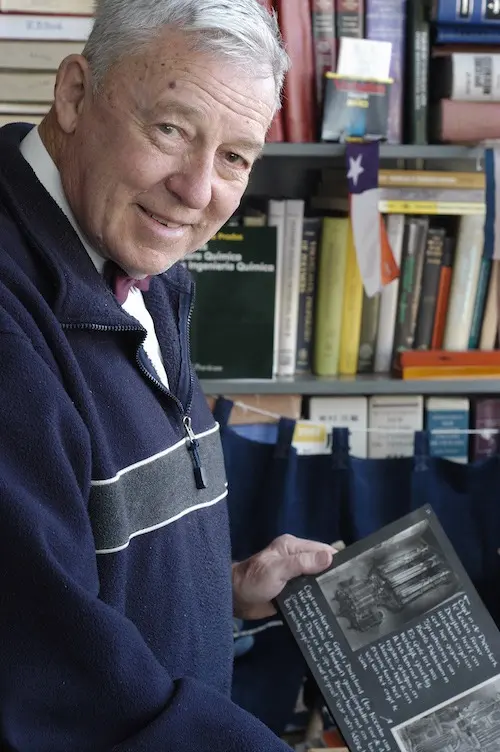Robert “Bob” Byron Bird was one of the most influential chemical engineers in the history of the field, but for his colleagues in the University of Wisconsin-Madison Department of Chemical and Biological Engineering, he was more: a mentor, a friend and a source of endless inspiration.
 Robert “Bob” Byron Bird
Robert “Bob” Byron Bird
Bird passed away on Nov. 13, 2020, at age 96.
A native of Bryan, Texas, Bird didn’t begin his academic career focused on engineering; in 1941 he enrolled at the University of Maryland, intent on studying foreign languages. His father, however, convinced him that engineering might lead to a better living, pointing out that there were big opportunities in the emerging and very difficult field of chemical engineering. His son decided to give it a try.
World War II paused Bird’s education for several years. He served in Europe as a second lieutenant in the 90th Mortar Battalion where he saw action from eastern Belgium to the Austrian border. He liked to remark that the U.S. Army helped him improve his high school French, Dutch and self-taught German.
On returning to the United States, he enrolled at the University of Illinois at Urbana-Champaign, completing his bachelor’s degree in 1947 before earning his PhD in physical chemistry at UW-Madison in 1950. He then completed postdoctoral work in Madison and at the University of Amsterdam, during which time he co-authored his first textbook, the 1,200-page Molecular Theory of Gases and Liquids, along with his advisor Joseph O. Hirschfelder and UW-Madison professor Charles F. Curtiss.
After teaching for a year at Cornell University, Bird was invited by chemical engineering pioneer Olaf A. Hougen to join the UW-Madison chemical engineering faculty in 1953.
Over the next 40 years, Bird’s contributions were foundational to modern chemical engineering. He conducted groundbreaking research in fluid dynamics, transport phenomena, the kinetic theory of polymers and the rheology of polymeric liquids. He was a prolific textbook writer, including the seminal text Transport Phenomena, co-authored with UW-Madison chemical engineering colleagues Warren Stewart and Edwin Lightfoot, which has been used in engineering curricula worldwide for six decades now.
He also authored texts on polymeric liquids and polymer science. And he never lost his love for languages: he was fluent in eight of them and published books on beginner’s Dutch and technical Japanese.
Bird received countless honors for his work, including nine honorary doctorates, a knighthood from Queen Beatrix of the Netherlands, and election to the National Academy of Engineering, National Academy of Sciences, the American Academy of Arts and Sciences, and the Wisconsin Academy of Sciences, Arts, and Letters.
In 1987, he received the National Medal of Science from President Ronald Reagan for his profoundly influential books and research on kinetic theory, transport phenomena, the behavior of polymeric fluids, and foreign language study for engineers and scientists.
He received the Bingham Medal, the highest honor from the Society of Rheology, as well as numerous national awards from the chemical engineering professional society AIChE and the American Society for Engineering Education.
Bird officially retired from UW-Madison in 1992, but he was a familiar face on the engineering campus for almost the rest of his life. In February 2014, the Department of Chemical and Biological Engineering hosted a symposium and banquet to celebrate his 90th birthday. In 2019, thanks to generous donors, the department established the Robert Byron Bird Department Chair in Chemical and Biological Engineering in his honor.
“Bob was an extraordinary intellect and one of the most celebrated chemical engineers of all time,” says Kreuz-Bascom Professor Regina Murphy, first recipient of the chair. “But what I will miss most is his gentle spirit and his abundant curiosity.”
Paul A. Elfers Professor, James A. Dumesic Professor, and Vilas Distinguished Achievement Professor Manos Mavrikakis concurs. “In the history of chemical engineering, very few will ever have the impact Bob Bird had,” he writes about his close friend and colleague. “He unified scattered domains of knowledge in a single theme: Transport Phenomena, by elucidating the connecting underlying physical principles with an unparalleled mathematical rigor and physical intuition. Besides a brilliant researcher, he was an exceptional teacher and a thoughtful mentor to students and colleagues alike.”
Bird was an avid outdoorsman and loved hiking and canoeing; in fact, Madison’s relative closeness to the wild Quetico Provincial Park in Ontario was one factor in his decision, way back when, to join the University. He took an annual trip into the wilderness every year he was able.
Outside of engineering, Bird had many other interests. He was an amateur genealogist, writing several books on his family heritage, as well as a writer of limericks and lover of puzzles. He was fond of opera and classical music and was an accomplished pianist, organist and composer.
And true to his nature, instead of a funeral, Bird requested an organ concert to be held in Madison, when conditions allow.
He is survived by a brother, three nieces, two nephews and their families.
Bird’s obituary and a tribute page are here. If you are interested in contributing to the memory of Bob Bird, please visit this link. For information on these opportunities, please contact Kyle Buchmann at kyle.buchmann@supportuw.org.